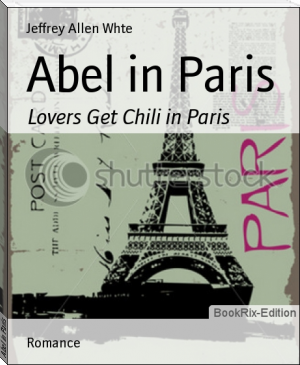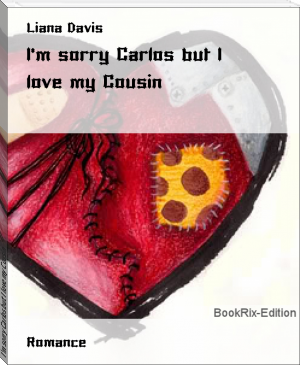Romeo and Juliet - William Shakespeare (cool books to read .txt) 📗

- Author: William Shakespeare
Book online «Romeo and Juliet - William Shakespeare (cool books to read .txt) 📗». Author William Shakespeare
JULIET: Yet let me weep for such a feeling loss.
LADY CAPULET: So shall you feel the loss, but not the friend
Which you weep for.
JULIET: Feeling so the loss, Cannot choose but ever weep the friend.
LADY CAPULET: Well, girl, thou weep’st not so much for his death,
As that the villain lives which slaughter’d him. JULIET: What villain madam?
LADY CAPULET: That same villain, Romeo.
JULIET: [Aside] Villain and he be many miles asun-
der.—
God Pardon him! I do, with all my heart;
And yet no man like he doth grieve my heart.
LADY CAPULET: That is, because the traitor murderer lives.
JULIET: Ay, madam, from the reach of these my hands: Would none but I might venge my cousin’s death!
LADY CAPULET: We will have vengeance for it, fear thou not:
Then weep no more. I’ll send to one in Mantua, Where that same banish’d runagate doth live, Shall give him such an unaccustom’d dram,
That he shall soon keep Tybalt company: And then, I hope, thou wilt be satisfied.
JULIET: Indeed, I never shall be satisfied
With Romeo, till I behold him—dead— Is my poor heart for a kinsman vex’d. Madam, if you could find out but a man To bear a poison, I would temper it;
That Romeo should, upon receipt thereof,
Soon sleep in quiet. O, how my heart abhors To hear him named, and cannot come to him. To wreak the love I bore my cousin
Upon his body that slaughter’d him!
LADY CAPULET: Find thou the means, and I’ll find such a man.
But now I’ll tell thee joyful tidings, girl.
JULIET: And joy comes well in such a needy time: What are they, I beseech your ladyship?
LADY CAPULET: Well, well, thou hast a careful father, child;
One who, to put thee from thy heaviness, Hath sorted out a sudden day of joy,
That thou expect’st not nor I look’d not for. JULIET: Madam, in happy time, what day is that?
LADY CAPULET: Marry, my child, early next Thursday morn,
The gallant, young and noble gentleman, The County Paris, at Saint Peter’s Church,
Shall happily make thee there a joyful bride.
JULIET: Now, by Saint Peter’s Church and Peter too, He shall not make me there a joyful bride.
I wonder at this haste; that I must wed
Ere he, that should be husband, comes to woo. I pray you, tell my lord and father, madam,
I will not marry yet; and, when I do, I swear, It shall be Romeo, whom you know I hate, Rather than Paris. These are news indeed!
LADY CAPULET: Here comes your father; tell him so yourself,
And see how he will take it at your hands.
{Enter CAPULET and Nurse.}
CAPULET: When the sun sets, the air doth drizzle dew; But for the sunset of my brother’s son
It rains downright.
How now! a conduit, girl? what, still in tears? Evermore showering? In one little body
Thou counterfeit’st a bark, a sea, a wind; For still thy eyes, which I may call the sea,
Do ebb and flow with tears; the bark thy body is, Sailing in this salt flood; the winds, thy sighs; Who, raging with thy tears, and they with them, Without a sudden calm, will overset
Thy tempest-tossed body. How now, wife! Have you deliver’d to her our decree?
LADY CAPULET: Ay, sir; but she will none, she gives you thanks.
I would the fool were married to her grave!
CAPULET: Soft! take me with you, take me with you, wife.
How! will she none? doth she not give us thanks? Is she not proud? doth she not count her blest, Unworthy as she is, that we have wrought
So worthy a gentleman to be her bridegroom?
JULIET: Not proud, you have; but thankful, that you have:
Proud can I never be of what I hate;
But thankful even for hate, that is meant love.
CAPULET: How now, how now, chop-logic! What is
this?
‘Proud,’ and ‘I thank you,’ and ‘I thank you not;’ And yet ‘not proud,’ mistress minion, you,
Thank me no thankings, nor, proud me no prouds, But fettle your fine joints ‘gainst Thursday next, To go with Paris to Saint Peter’s Church,
Or I will drag thee on a hurdle thither.
Out, you green-sickness carrion! out, you baggage! You tallow-face!
LADY CAPULET: Fie, fie! what, are you mad? JULIET: Good father, I beseech you on my knees,
Hear me with patience but to speak a word.
CAPULET: Hang thee, young baggage! disobedient wretch!
I tell thee what: get thee to church o’ Thursday, Or never after look me in the face:
Speak not, reply not, do not answer me;
My fingers itch. Wife, we scarce thought us blest
That God had lent us but this only child; But now I see this one is one too much, And that we have a curse in having her:
Out on her, hilding!
Nurse: God in heaven bless her! You are to blame, my lord, to rate her so.
CAPULET: And why, my lady wisdom? hold your tongue, Good prudence; smatter with your gossips, go.
Nurse: I speak no treason.
CAPULET: O, God ye god-den. Nurse: May not one speak?
CAPULET: Peace, you mumbling fool! Utter your gravity o’er a gossip’s bowl;
For here we need it not.
LADY CAPULET: You are too hot. CAPULET: God’s bread! it makes me mad:
Day, night, hour, tide, time, work, play, Alone, in company, still my care hath been
To have her match’d: and having now provided
A gentleman of noble parentage,
Of fair demesnes, youthful, and nobly train’d, Stuff’d, as they say, with honorable parts, Proportion’d as one’s thought would wish a man; And then to have a wretched puling fool,
A whining mammet, in her fortune’s tender, To answer ‘I’ll not wed; I cannot love,
I am too young; I pray you, pardon me.’ But, as you will not wed, I’ll pardon you:
Graze where you will you shall not house with me: Look to’t, think on’t, I do not use to jest.
Thursday is near; lay hand on heart, advise: An you be mine, I’ll give you to my friend; And you be not, hang, beg, starve, die in the streets,
For, by my soul, I’ll ne’er acknowledge thee, Nor what is mine shall never do thee good: Trust to’t, bethink you; I’ll not be forsworn.
[Exit.]
JULIET: Is there no pity sitting in the clouds, That sees into the bottom of my grief?
O, sweet my mother, cast me not away!
Delay this marriage for a month, a week; Or, if you do not, make the bridal bed
In that dim monument where Tybalt lies.
LADY CAPULET: Talk not to me, for I’ll not speak a word:
Do as thou wilt, for I have done with thee. [Exit.]
JULIET: O God!—O nurse, how shall this be prevented? My husband is on earth, my faith in heaven;
How shall that faith return again to earth, Unless that husband send it me from heaven By leaving earth? comfort me, counsel me.
Alack, alack, that heaven should practise stratagems
Upon so soft a subject as myself!
What say’st thou? hast thou not a word of joy? Some comfort, nurse.
Nurse: Faith, here it is.
Romeo is banish’d; and all the world to nothing, That he dares ne’er come back to challenge you; Or, if he do, it needs must be by stealth.
Then, since the case so stands as now it doth, I think it best you married with the county. O, he’s a lovely gentleman!
Romeo’s a dishclout to him: an eagle, madam, Hath not so green, so quick, so fair an eye
As Paris hath. Beshrew my very heart,
I think you are happy in this second match, For it excels your first: or if it did not,
Your first is dead; or ‘twere as good he were, As living here and you no use of him.
JULIET: Speakest thou from thy heart?
Nurse: And from my soul too; Or else beshrew them both.
JULIET: Amen! Nurse: What?
JULIET: Well, thou hast comforted me marvellous much. Go in: and tell my lady I am gone,
Having displeased my father, to Laurence’ cell, To make confession and to be absolved.
Nurse: Marry, I will; and this is wisely done. [Exit.]
JULIET: Ancient damnation! O most wicked fiend! Is it more sin to wish me thus forsworn,
Or to dispraise my lord with that same tongue Which she hath praised him with above compare So many thousand times? Go, counsellor;
Thou and my bosom henceforth shall be twain. I’ll to the friar, to know his remedy:
If all else fail, myself have power to die. [Exit.]
ACT IV
SCENE I: Friar Laurence’s cell.
[Enter FRIAR LAURENCE and PARIS.]
FRIAR LAURENCE: On Thursday, sir? the time is very short.
PARIS: My father Capulet will have it so; And I am nothing slow to slack his haste.
FRIAR LAURENCE: You say you do not know the lady’s mind:
Uneven is the course, I like it not.
PARIS: Immoderately she weeps for Tybalt’s death, And therefore have I little talk’d of love;
For Venus smiles not in a house of tears. Now, sir, her father counts it dangerous
That she doth give her sorrow so much sway, And in his wisdom hastes our marriage,
To stop the inundation of her tears;
Which, too much minded by herself alone,
May be put from her by society:
Now do you know the reason of this haste.
FRIAR LAURENCE: [Aside] I would I knew not why it should be slow’d.
Look, sir, here comes the lady towards my cell. [Enter JULIET]
PARIS: Happily met, my lady and my wife! JULIET: That may be, sir, when I may be a wife. PARIS: That may be must be, love, on Thursday next. JULIET: What must be shall be.
FRIAR LAURENCE: That’s a certain text. PARIS: Come you to make confession to this father? JULIET: To answer that, I should confess to you.
PARIS: Do not deny to him that you love me.
JULIET: I will confess to you that I love him. PARIS: So will ye, I am sure, that you love me. JULIET: If I do so, it will be of more price,
Being spoke behind your back, than to your face. PARIS: Poor soul, thy face is much abused with tears.
JULIET: The tears have got small victory by that; For it was bad enough before their spite.
PARIS: Thou wrong’st it, more than tears, with that report.
JULIET: That is no slander, sir, which is a truth; And what I spake, I spake it to my face.
PARIS: Thy face is mine, and thou hast slander’d it. JULIET: It may be so, for it is not mine own.
Are you at leisure, holy father, now;
Or shall I come to you at evening mass?
FRIAR LAURENCE: My leisure serves me, pensive daugh- ter, now.
My lord, we must entreat the time alone.
PARIS: God shield I should disturb devotion! Juliet, on Thursday early will I rouse ye:
Till then, adieu; and keep this holy kiss. [Exit.]
JULIET: O shut the door! and when thou hast done so, Come weep with me; past hope, past cure, past help!
FRIAR LAURENCE: Ah, Juliet, I already know thy grief; It strains me past the compass of my wits:
I hear thou must, and nothing may prorogue it, On Thursday next be married to this county.
JULIET: Tell me not, friar, that thou hear’st of this, Unless thou tell me how I may prevent it:
If, in thy wisdom, thou canst give no help, Do thou but call my resolution wise,
And with this knife I’ll help it presently.
God join’d my heart and Romeo’s, thou our hands; And ere this hand, by thee to Romeo seal’d,
Shall be the label to another deed,
Or my true heart with treacherous revolt Turn to another, this shall slay them both: Therefore, out of thy long-experienced time, Give me some present counsel, or, behold,
‘Twixt my extremes and me this bloody knife
Shall play the umpire, arbitrating that Which the commission of thy years and art Could to no issue of true honor bring.
Be not so long to speak; I long to die,
If what thou speak’st speak not of remedy.
FRIAR LAURENCE: Hold, daughter: I do spy a kind of hope,
Which craves as desperate an execution.
As that is desperate which we would prevent. If, rather than to marry County Paris,
Thou hast the strength of will to slay thyself, Then is it likely thou wilt undertake
A thing like death to chide away this shame, That copest with death himself to scape from it:
And, if thou darest, I’ll give thee remedy.
JULIET: O, bid





Comments (0)